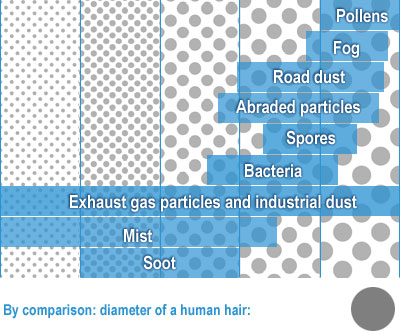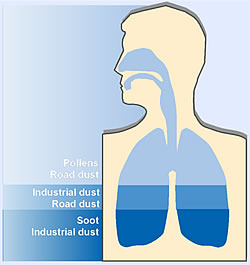Your Health is a Concern When Driving
In vehicles without a cabin air filter, concentration levels may be as much as six times higher than values at the roadside. Besides allergic reactions, they can also lead to breathing tract diseases, cardiovascular problems and asthma.
Micron particle filters protect occupants effective against fine dust, pollen, road dust and other respirable fine particles. They minimize the health risks in the vehicle and provide more comfort while driving.
Protection Against Particles and Fine Dust
A cubic meter of respiratory air may contain between 10 and 80 billion particles – depending on the weather and the local conditions involved. Where precisely the particles will be deposited when inhaled will depend on their size. Basically, a distinction is drawn between two particle size categories: larger than 2 micrometers (µm = a thousandth of a millimeter) and smaller than 2 micrometers.
Small Particles
 Particles that are larger than approx. 2 µm will mostly be deposited in the respiratory passages. They may trigger allergic reactions and impair well-being. Allergy-sufferers, in particular, suffer from the small particles. Streaming eyes, dripping noses, shortness of breath or sneezing attacks reduce concentration levels and increases the risk of accidents. Sneezing at a speed of 60 miles an hour means you´re driving blind for 30 m.
Particles that are larger than approx. 2 µm will mostly be deposited in the respiratory passages. They may trigger allergic reactions and impair well-being. Allergy-sufferers, in particular, suffer from the small particles. Streaming eyes, dripping noses, shortness of breath or sneezing attacks reduce concentration levels and increases the risk of accidents. Sneezing at a speed of 60 miles an hour means you´re driving blind for 30 m.
Fine Dust
 Particles that are smaller than approx. 2 µm will predominantly be deposited in the lower parts of the respiratory passages and in the lungs. They are the ones most commonly encountered in the air. Particles of this size cannot all be retained by the mucous membranes in the nasal and pharyngeal cavities. Most of them are deposited in the lower respiratory passages and in the lungs. These respirable particles include pollutants like bacteria and fungal spores, industrial dusts, fine abraded particles and soot or diesel soot. This is particularly injurious to human health, because it may trigger infections in the lung, and also transports toxic substances. Diesel soot is regarded as a cause for diseases of the respiratory tract, cardiovascular complaints and asthma. A carcinogenic effect is also ascribed to it. Micron particle air filters offers applications providing particularly good protection against precisely these ultra-fine dust particles.
Particles that are smaller than approx. 2 µm will predominantly be deposited in the lower parts of the respiratory passages and in the lungs. They are the ones most commonly encountered in the air. Particles of this size cannot all be retained by the mucous membranes in the nasal and pharyngeal cavities. Most of them are deposited in the lower respiratory passages and in the lungs. These respirable particles include pollutants like bacteria and fungal spores, industrial dusts, fine abraded particles and soot or diesel soot. This is particularly injurious to human health, because it may trigger infections in the lung, and also transports toxic substances. Diesel soot is regarded as a cause for diseases of the respiratory tract, cardiovascular complaints and asthma. A carcinogenic effect is also ascribed to it. Micron particle air filters offers applications providing particularly good protection against precisely these ultra-fine dust particles.
How Does Micron Air Particle Filters Work?
Basically the filter media of both micron air cabin air filters are created equal: The prefilter is responsible for the filtration of coarse particles. The microfiber layer filters respirable and ultrafine particles from the air, for example particles which are found in diesel exhaust and soot. Both micron air products provides effective protection against fine dust.
The micron air combination filter has an additional layer of activated carbon to adsorb odors and gases, such as benzene and ozone. This is protected by a covering layer.

